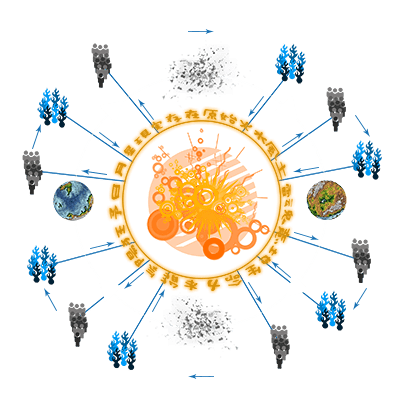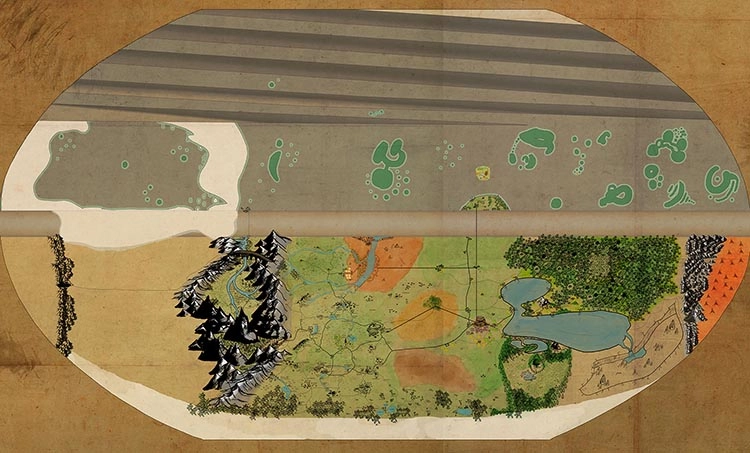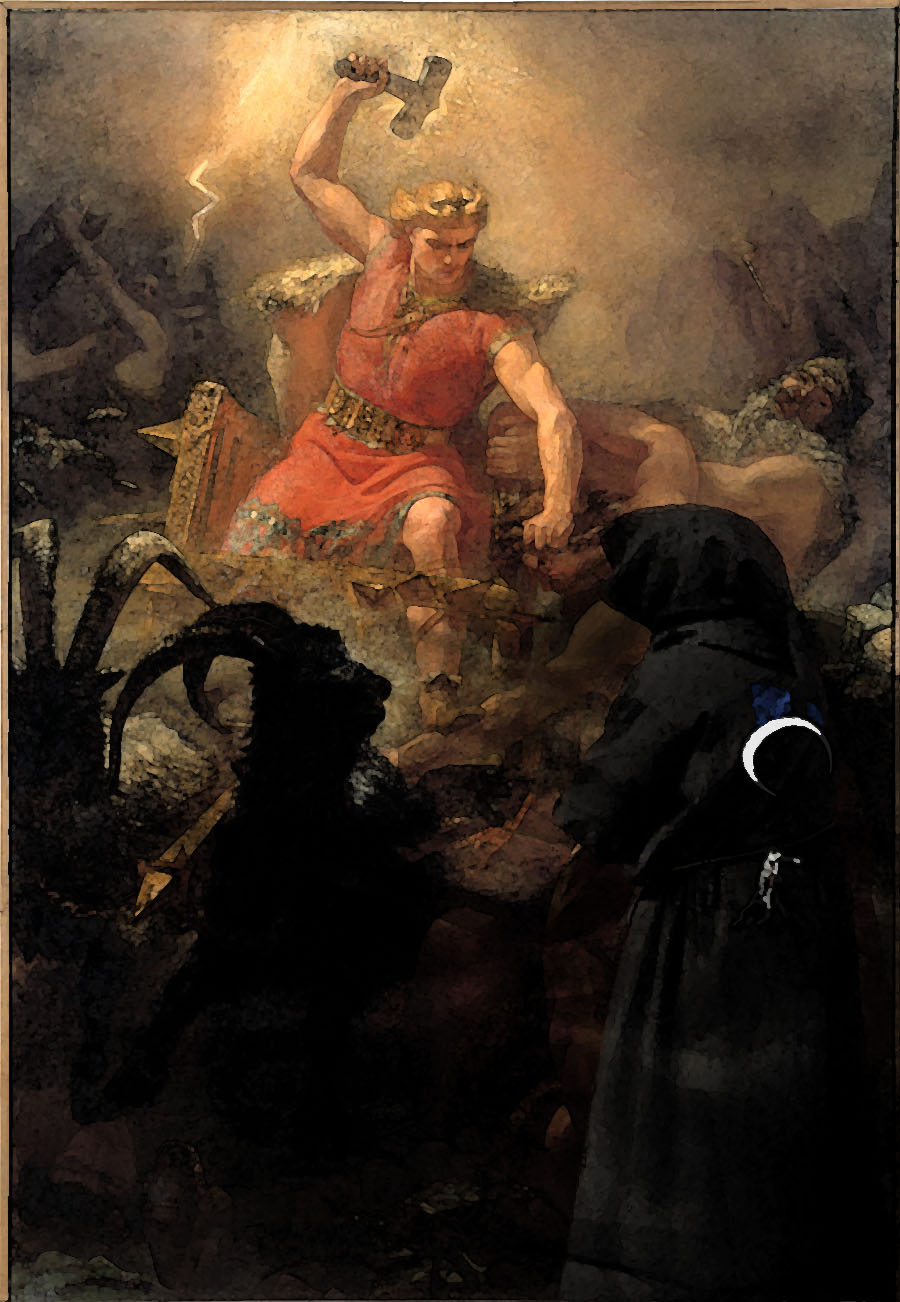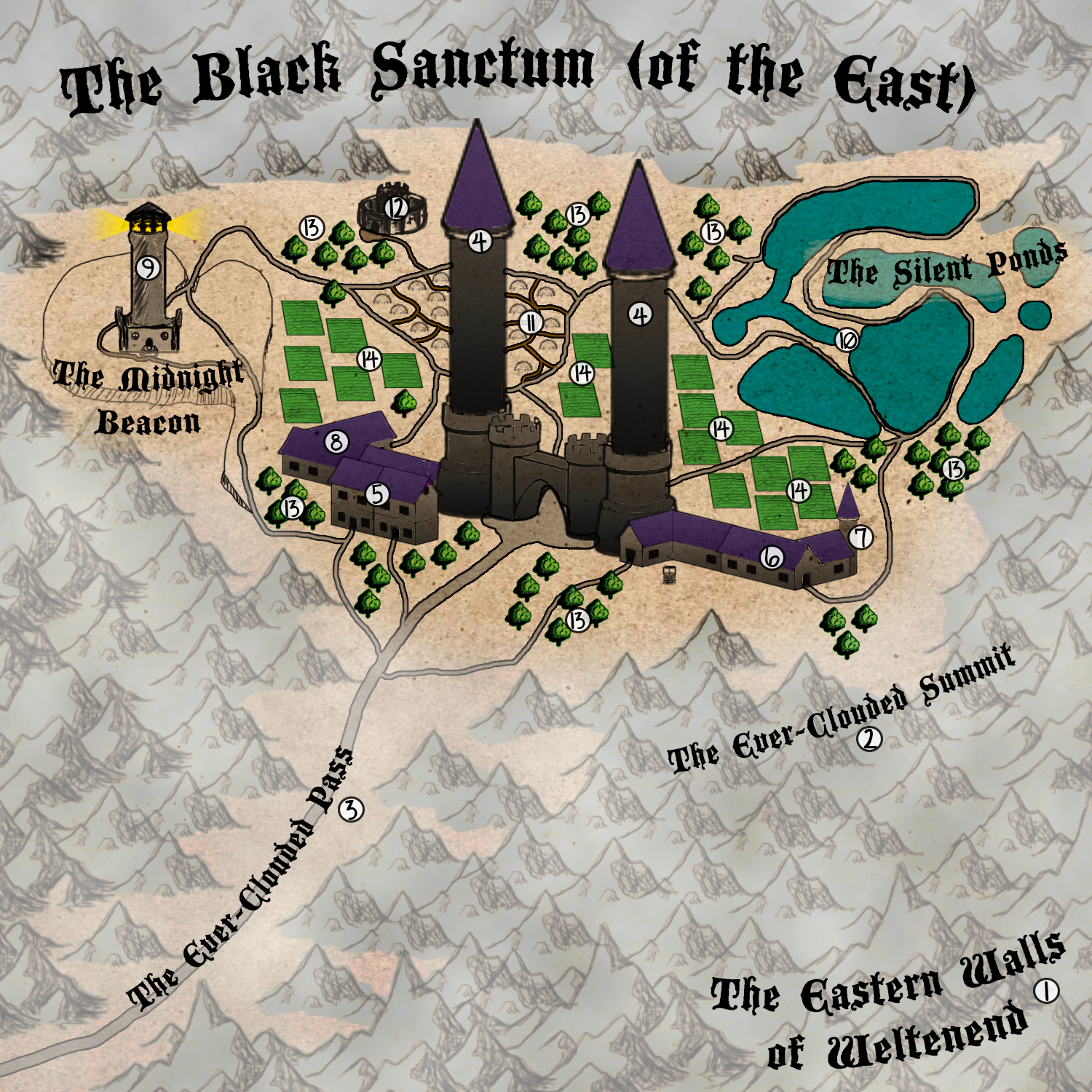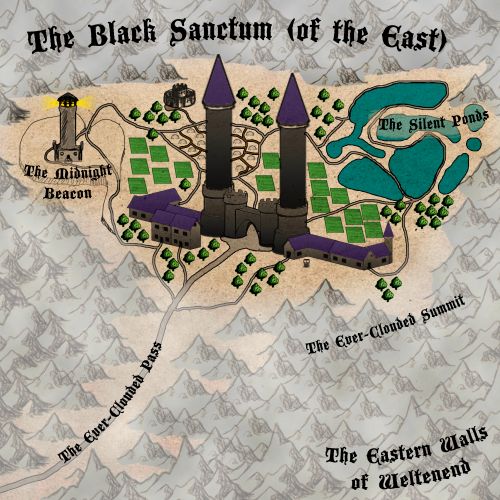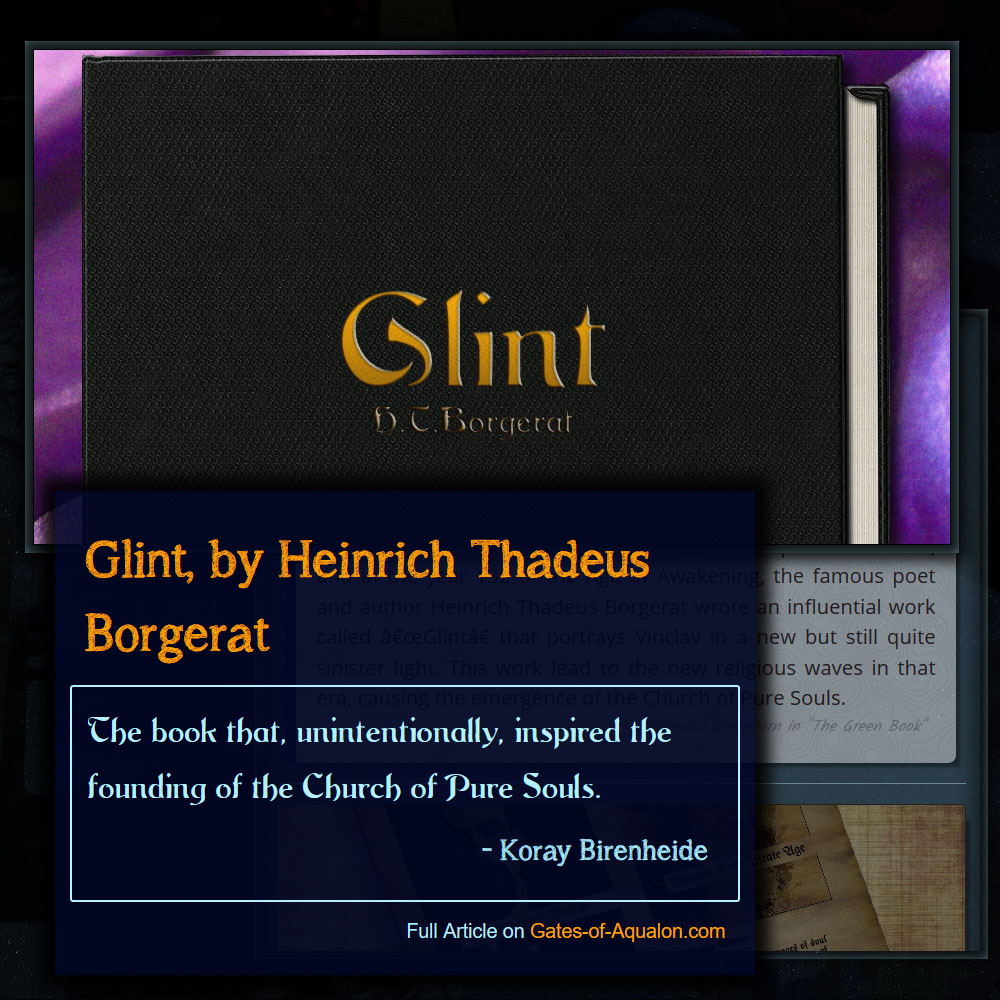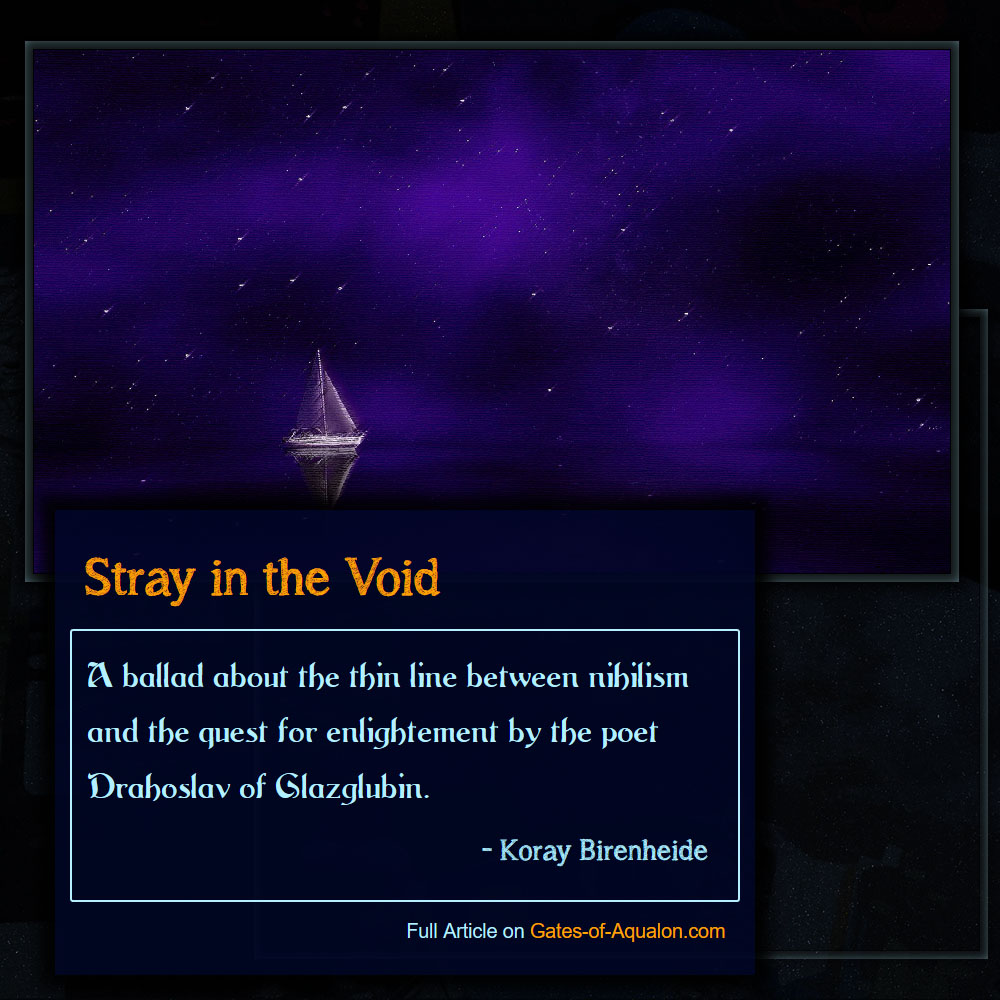Hide beneath your blanket, child, for when the black men come from far away, they bring the night and eat the sun like crows eat bodies from the field. The Null are shadows made from flesh, who walk through pitch black gates, who bring bad dreams, who come from far away.
And at the end of the world I found a treasure chest. A treasure chest not filled with coins and gems but with wisdom and knowledge. I have seen a thousand thousand books from ages past and many lands in shelves well tended by learned men who wear the black with pride. A sanctum made from obsidian holds wisdom in its spires, and an archive made of marvels holds the history of the ages.
"Dichotomy. And the line is drawn in education. For the popular tales of the Null do not do them justice.
Yes, their strength comes from shadow; but this is not the tangible shadow the Shadow Society1
The History Behind the Order
From the Ashes of Calamity
In the 100s of the Age of Awakening2The original Grand Master of the Null is believed to be Jorgenjund Mansepil, one of the most powerful mages of the Age of Awakening; a magus of earth who had lead the circle of mages from the Glade of Erdwald, which would later become the great Gladering University of the Arcane. He and many of his acolytes met with other mages of the Middle Lands during a secret gathering after the burning of Estverde had transpired, and of these, some decided to find a way to better exert control over the dangerous nature of unbridled magic. Led by Mansepil and two of his most esteemed colleagues, Ira Tervinkel, a magus of water from the Hall of Rahn, and Timothy Marodestein, a magus of fire from the Bonfire Shrine, both, like the Glade of Erdwald, destined to later become recognized Magus Academies of the Middle Lands, they traveled beyond the Yamato Kingdom, seeking shelter far away from civilization at the Eastern Walls of Weltenend.The third great age of Aqualon, which lasted from 5700 to 5900 after the Reshaping of the World. (Shortened 'AA')., tensions with the city state of Estverde began to rise due to a number of trade embargoes and arguments over landownership largely based on Yamato expansion policy. Hestia Bygate, a western magus from the Bonfire Shrine that had worked her way up through the ranks of the Yamato court, was in charge of the provinces most affected and in danger and decided to push for a preemptive annexing of Estverde, promising the beginning of a greater empire to the Emperor and his generals, who were all too eager to employ her and her deadly mages, the Ryûga Order, as well as commit large contingents to an all out assault on the Estverdians. All of this culminated in one of history's greatest tragedies when the Estverdians disposed of the first and second infantry division of the Yamato Kingdom at the beginning of the battle and then made the mistake of provoking Hestia during the negotiations that followed the ensuing siege. In a flash of grand order magic, she broke her gates in twain, blighting herself almost to death as she ignited and then carbonized the entire city, burning it all to ashes, every person, every brick, every speck of dust. After this, the political backlash against the Yamato Kingdom was severe. The place where Estverde once had stood had been turned into a blemish on the land and on the mind of the people, for it forever marked the spot where over twenty thousand people had been incinerated by the folly of magic.
When the mages of the Middle Lands traversed the Yamato Kingdom, they picked up a number of mages that used to belong to the Ryûga Order, originally formed by Hestia. In their quest for penance, they vowed to help the party in any way they could. They traveled to the Eastern Walls of Weltenend, and from the barren rock face Mansepil raised two grand towers of volcanic glass, obsidian, to serve as the houses of the new order, which they named Null. And with the help of Tervinkel, he made the land atop the Ever-Clouded Summit more fertile and ready to be blessed with the seeds the group had brought with them. Soon they were self-sufficient, and their research into new forms of magic begun. They started their quest for the fifth gate.
The Gate of Atonement
The five inner gates are made from these energies: Enlightenment, Madness, Foresight, Wisdom, and Shadow.
Opening one or more of these gates even a crack will enable the use of magic, but opening them properly can lead to superior magic and magical powers that go beyond the regular elemental magic most mages manage to manifest. This is where the Null came into play. In a time where elemental magic was still not widely spread and rooted firmly in parts of the Middle Lands and the North, the full extent and danger of magic had been laid bare by the unforgettable deed of Hestia Bygate. Those of her former disciples and some of the more learned mages and scholars of the Middle Lands banded together and sought a way to prevent a second Estverde from happening ever again, traveling to the ends of Aqualon to find their way in seclusion and arcane studies.
In their search for salvation, they unlocked their fifth gates, realizing that the very shadow they feared during their prior quests for enlightenment would become the engine of their salvation, for it made null and void all and any magic they bent their minds towards.
The Null Concord
When the Null came, all of this changed: magic suddenly vanished from the battlefields as armies were blanketed in dark energies washing over them from the wide open gates of a few powerful individuals. And as the reputation of the Null grew fiercely over the following years, they began negotiations and mediation with all the super powers and greater nations of the Age of Awakening. In 150 AA, they managed to initiate the first behind-the-scenes negotiations towards what would later become known as the Null Concord.
It took over six more years to hammer out an agreement that all the involved nations would sign, but in 156 AA, the proliferation and use of weapons of mass destruction (WMDs) as well as high tier destructive magic capable of inflicting significant collateral damage were finally outlawed. By uniting mages and technocrats and making them enforce the Concord against each other, the international agreement was sure to stand firm, for neither side was keen to force the other one to war against them.
Unbeknownst to the Brotherhood of the Null, the brokering of the Null Concord almost fell flat due to the Yamato Kingdom and city of Fulgrath being reluctant to commit to a long-term non-proliferation treaty against high-tier magic research and the development of WMDs and was only saved by the secret intervention of the Shadow Society, which leveraged extensive political and financial clouts behind the scenes to make the treaty happen in 156 AA
The Great War
More than this, the most powerful of the Null who could fully open their fifth gate were capable of briefly eliminating the superhuman strength and toughness of the Old Gods, fighting them on even ground. It was for this reason that the Null started practicing old Yamato martial arts from masters sent to the eastern sanctum by imperial decree.
The flipside was that the Null insisted on the absolute enforcement of the Null Concord, preventing the Allied Forces from bringing the full brunt of their magic and technology to bear anywhere but on the wide stretches of the Untamed Meadows where the ashes of Estverde lay. Still, this was a compromise which could be realized during several large battles due to the Old Gods' proneness to being goaded into 'honorable confrontations'.
Descending Into Myth and Rising as Legends
After the end of the Great War, the Great Land was war-weary, and within the first century of the new age, the Null retreated back into their Sanctums. While not particularly shut off from the world, they elected to send their Brothers and Sisters out only in secret, doing all in their power to foster the climate of peace and prosperity. Throughout the centuries, many pilgrims made the long journey to the Black Sanctums every year, seeking the wisdom of the monks, bringing gifts and stories, and soon the tradition arose to bring books with them as an offering, for these were prized by the Null above all else. In fact, the monks still traveled the World under the guise of pilgrims to collect books and do their work, with only few remaining within ruling courts in an official capacity as representatives of their order.The Great Peace continued for far longer than anyone could have ever imagined, and during their 1700 years of seclusion, the popular image of the Null grew murky and obscured, often darkening in time, being dramatized by storytellers for effect. These days, common folk are split between wariness and respect when the Null become the topic of conversations; just another reason to keep a low profile.
But now as the Age of Gears and Elements3
The Brotherhood of the Null
Arbiters of Balance, Vigils of Fate, Chroniclers of Knowledge
These three hefty titles describe the work of the Brotherhood of the Null. After the Null Concord was established, the Brothers and Sisters of the Null traveled the world, always ready to protect settlements from grand tier magic wielded by desperate people in war times and madmen who sought power blindly. Many a Null blighted themselves near to death stopping a reckless magus in his or her track in times of war. And their work became all the more pressing and intense after the First Invasion, when the Nordmen and their gods declared war on the Great Land.But with such a sizable world to protect, how could the Null ever hope to prevail without stretching themselves too thin? Well, this is where the Three-Eyed Sentinels come into play. A special sub-order within the Brotherhood of the Null, they went beyond the study of the fifth gate and in fact focused on their third gate, the Gate of Foresight, which carries with it powers of precognition. Tying into the fabric of the Great Clockwork like this can drive a man mad, and most of the Three-Eyed Sentinels do seem strange and no longer of this world. But their gibbering holds golden nuggets of truth and insight the Grand Master of the Null interprets, sending his monks far away to quell fires that have not yet been lit.
Lastly, the Null keep a treasure safe within the bounds of their sanctums: knowledge. Within their halls they have collected more tomes and books than even the great Magus Academies of the Middle Lands. They are chroniclers of the past and keepers of the truth, who have records reaching back to the first days since the Reshaping of the World. Scholars from all over the world, even the highly advanced technocracies of Miyako Fluxum and Borealis, quest to the Black Sanctums to have ancient tomes and documents transcribed for them. Requests to do so come in regularly through various channels, though, just as often, learned men will make the long journey in person just to behold the storehouse of knowledge hidden behind obsidian spires.
Headquarters
The Walls of Weltenend lie to the east and the west of the Great Land and encompass the Lands of Inferno, where constant volcanic and tectonic activity renders the land uninhabitable and the air toxic. On the slopes facing the Great Land, a Black Sanctum of the Null is set into the high peaks on either of the two grand mountain ranges.The more famous one of the two is the Black Sanctum of the East, which can be accessed by traveling through the Untamed Meadows using the Twilight Road, a relatively uneventful journey. The Black Sanctum of the West is far more difficult to reach, having the entirety of the ocean-like lake Glazglubin or the endless Brammenwoods forest as well as the Worldshaper's Bootprint between it and the more populated regions of the Great Land (see world map).
Show Map Legend
- East of the Yamato Kingdom, past the Untamed Meadows where the ashes of the former proud city state of Estverde rest lie the Eastern Walls of Weltenend, a natural barrier against the smoldering heat and fumes of the Lands of Inferno.
- "When I was a boy, I lost my family during a yarenma attack. They just flew over the village and everyone dropped and never woke up. I had been wandering in the woods, so I was spared their fate. When I walked through the Untamed Meadows to Weltenend, all was bleak to me, and only the kindness of farmers I met along the way kept me alive. Finally, I walked up the pass for many, many hours, into the drifting white that forever surrounds the Ever-Clouded Summit, and when I arrived, I thought the bleakness was there too, but the fog rolled away in the winds and unveiled before me the beautiful spires of the Black Sanctum, and it was as if the fogs inside my heart rolled away as well for a moment."
- Master Kenichi Murakawa- The Ever-Clouded Pass is the well-tended path leading from the foot of the mountain range up to the Ever-Clouded Summit, where the sanctum is located. It leads through the cloud cover, drenching travelers on their path up or down, so especially pilgrims that leave the sanctum are well-advised to take wrapped spare clothing with them, lest they catch a dangerous cold after their arduous descent.
- Wrought from monolithic obsidian by the great earth magus Jorgenjund Mansepil during the construction of the Black Sanctum, these spires are ominous yet beautiful and serve as a totemic focus for those meditating on the nature of the fifth gate. The chambers of the monks that live in the Black Sanctum are also located throughout the two spires on many levels. At the top of the left spire (seen from the Ever-Clouded Pass), located within the large roof, lie the chambers of the Grand Master of the Black Sanctum.
"The knowledge contained here is not dead. I have studied many things in these halls: philosophy of old Yamato, arithmetic, history, and even Kaltani folklore, and so have most of the monks. We are very learned men, and other learned men from around the world come to partake in the cornucopia of written words stored here at the end of the world."- Master Kenichi Murakawa- "Ah yes, the Dining Hall. Pilgrims keep asking me how we can stand only having two meals a day, and I keep telling them: 'try it for a while, after one or two weeks you will not miss breakfast at all.' Besides, no one starves here; if you are really hungry, just ask the brother or sister on cooking duty..."
- Master Kenichi Murakawa.- There is always one Grand Apothecary and one apprentice in the Black Sanctum. They are housed in this tower where they can perform herb lore and alchemy and tend the sick and wounded with many beds available. They also prepare twilight lilicanth, a drug used by those aiming to become Three-Eyed Sentinels.
- A desk in the Apothecary's Tower.- These halls have many desks and writing utensils available. Archivists and scholars among the monks come here to study the wealth of tomes from within the archives and library of the Black Sanctum and transcribe important and ancient texts before they fade or become too damaged to read. Transcription services performed by the Brotherhood of the Null for scholars and universities from all around the world are also a significant source of revenue for the Black Sanctum.
- "The clouded Walls of Weltenend, so monolithic to the eye, towered up around me in the night and I had lost the way. But then a bright glint in the distance put me back on track and I found my way to the Black Sanctum. Praise the Midnight Beacon!"
- From Haruki Masamono's "Koku no Tabi 黒の旅 - A Pilgrim's Log"- The Silent Ponds are a place for quiet meditation and reflection, but also for fishing. In fact, the Brotherhood of the Null maintain carefully tended fish farms here to feed themselves in conjunction with the fields, which are also being tilled by resident monks.
- A harvest of catfish being hauled in from a Silent Ponds fish farm.- Much like the Church of Pure Souls, the Brotherhood of the Null bury their dead in graves marked with gear-shaped headstones. The tradition does, in fact, originate here in the Black Sanctums of the Null, not with the church, which only adopted it later on.
- These are the Halls of the Three-Eyed Sentinels. Hidden away in the dark are those who have wedged their third gate open. The gate of foresight attunes a person to the Great Clockwork in a strange way, and they begin to see visions of the past, present, and future, often going mad if they do not shut the gate soon. The Sentinels have forsaken their sanity to provide a necessary service to the Brotherhood of the Null. It is by their grace that the monks know where to go when in order to prevent the escalation of magic and the unbalancing of the world.
- In the fields around the Black Sanctum, rice and hops are cultivated, and lush herbaries and vegetable patches provide ample yields for fine cooking and potent medicines as well as psychoactive drugs.
- Some fresh and dried herbs harvested in the herbaries.
A Last Haven for the Blighted
The Brothers of the Null do not call those afflicted with spellblight 'blighters' or 'yasha'. They have no derogatory term for these people, for the Null themselves are often affected by spellblight when they seek to suppress dangerous magic. Many folk of the Great Land that have reached the final stage of the sickness seek refuge with the Null and can hope to live a better life in the seclusion of the Black Sanctum than on the streets or in the mountains. When a person suffers from nullsickness, the Null themselves refer to them as 'gate breakers'.Unfortunately, due to the mythization of the order over the course of the current age, many blighters remain oblivious to the potential safe haven the Black Sanctums could offer them.

